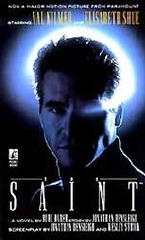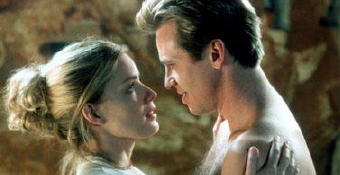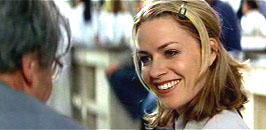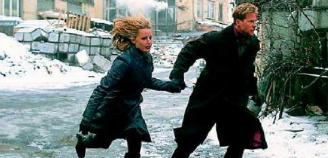Tue 6 May 2008
Movie Review – THE SAINT (1997).
Posted by Steve under Characters , Crime Films , Reviews[8] Comments
THE SAINT. 1997. Val Kilmer, Elizabeth Shue, Rade Serbedzija, Valery Nikolaev, Alun Armstrong (as Inspector Teal), Roger Moore (voice only). Based on the character created by Leslie Charteris. Directed by Philip Noyce. [Novelization by Burl Barer; Pocket, 1997.]

My first reaction? Beware of movies about fictional characters whose creators are not included in the on-screen credits. That’s what the common wisdom says, or if it doesn’t, it should.
Be also wary – this is my own advice – of movies that begin by telling the childhood origins of the character. Especially when said character’s exploits extended for well over a fifty year period (1928-1983) – under the control of said creator if not always written – without the creator ever finding the need to chronicle the characters origins, which are always (perhaps) best left to the reader’s imagination.
The reviews of this movie were almost universally bad, although in some cases as if reluctantly so, but – and this is a big but – the reaction of ordinary civilian reviewers (on IMDB, for example) have been almost universally positive. Some call it their favorite movie of all time, others while not going that far, admit to having watched it over and over again many times.
Why the great disconnect? I’ve thought it over for a couple of days now, and I’ve listened to the director’s voice-over commentary, which (as usual) pointed out any number of items I missed the first time through, and I think the division of opinion comes down to this.
Those who liked the movie did not know anything about Charteris’s character – a devil-may-care adventurer with an ever-present twinkle in his eye as he swindled the bad guys’ loot right from under their eyes – nor did they know anything of Roger Moore’s TV version of the character (much less George Sanders in the movie versions).

Roger Moore, I personally liked in the role, although (as I remember) he was a little stiff and not quite as rakishly (more impishly, perhaps) devil-may-care as I would have liked.
But Moore stopped playing the Saint in 1969, which (I’m guessing) is well before most of the viewing audience for this new version was born, and Val Kilmer is all they know (and all they got). Which may sound snarky, and if so, I mean only 30 to 40 percent of it.
For in fact, if you take the character he plays – he is not even Simon Templar yet, as this revisionist story would have it – without an idea of who he is to become – I think you might even enjoy watching this tormented loner, unsure of his true identity, a thief with undated Internet gimmicks and capabilities – not to mention his many disguises which are as varied and clever as they are numerous – and seeing him grow into someone whom the director refers to as “worthy of Sainthood.”

Thanks, of course, to the love of a beautiful woman, Dr. Emma Russell, played by Elizabeth Shue, an expert on cold fusion, the formulas for which some scummy post-Communist Russians would love to get their hands on.
That Emma Russell acts like she is sixteen years old and has never been within two feet of a man before is very nearly beside the point. She is innocent and vulnerable, and she is what Val Kilmer’s character needs to shake up his life and start him over again. (He certainly needs it.)
It also does not seem to matter that cold fusion does not seem to work, then or now, even though when a miracle is desperately needed in the movie – and in the middle of Red Square yet! – a miracle is certainly what indeed does happen.

Emma Russell’s heart condition also seems improve greatly as the movie goes on. Perhaps it is all the running she does, or edging her way with Simon along the icy flank of the Moscow River, or escaping with him through the city’s underground tunnels. Exercise like this is just what the doctor ordered. Or needed.

An earlier version in which she dies in the end was wisely, wisely reconsidered. The ending is a bit of a muddle anyway, but if her cheery optimism had been squashed in the end like a bug, the audience would have roundly booed. I would have, at least, and loudly.
My second reaction, then, ignoring the fact that movie is about a character I think I should know — but as the film goes on, I realize in frustration (if not something akin to anger) that I do not — with my expectations suitably altered, I enjoyed the movie considerably more the second time through than I did the first.
But will I ever watch it again? The future is hazy on that, but the possibility is higher than the chance that I will ever watch a version with George Sanders in it more than once. One with Roger Moore in it, from TV? Yes.
May 6th, 2008 at 4:01 pm
I have read and enjoyed all of the Charteris Saint stories, but this movie did nothing but harm to the character. The Saint may be cocky and self-assured, but never smarmy as played by Val Kilmer, especially when donning those horrid disguises. I have (I believe) figured out the reason why they never made a sequel: There is a just God.
May 6th, 2008 at 4:04 pm
Jerry
It is obvious on which side of the disconnect you’re on.
Best
Steve
May 7th, 2008 at 3:19 pm
I grew up on Roger Moore’s Saint. And thought (in 1997) that this version was awful!
It amazes me that anyone could like this. That is not intended as a slur on people who like this. Just it never occurred to me that anyone could possibly enjoy this movie 🙂 It seemed impossible…
Your article gives food for thought. Maybe there has been a huge shift in generational taste.
Sean Bean gives a creditable performance in director Philip Noyce’s “Patriot Games”. Aside from this, I’ve never liked any of Noyce’s work.
May 7th, 2008 at 3:23 pm
PS If you’d posted that hundreds of people had been seen by reliable scientists to be walking on water, I could not be more startled.
The whole idea that this movie has fans just seems impossible.
May 7th, 2008 at 6:17 pm
Steve is right.
Just looked at the user comments on IMDB.
Lots of people LOVE The Saint.
One thing: many users seem to appreciate the love scenes in The Saint. They want a movie with some romance in it.
There is nothing wrong with that. It seems like a decent human emotion, in fact.
Maybe I let my preconceptions about what The Saint should be like interfere back in 1997.
Thanks for an interesting post!
May 7th, 2008 at 6:56 pm
Mike
I think you just said in 100 words what I tried to do in a thousand.
Best
Steve
May 8th, 2008 at 3:09 pm
I’d never read a Saint novel or a story when I saw this and still I thought it sucked big time. No comprehensible plot, no interesting characters and not much tension between them, too much fireworks… And I still haven’t read a Saint book or a story (although I’ve been interested in Sturgeon’s and others’ possible pseudonymous connection with the books).
May 8th, 2008 at 3:18 pm
Juri
Do read one of Charteris’s own books or stories. They might not be to your taste, but I think there’s a chance. I never cared very much for the ghost-written ones, but given Charteris’s OK on the final versions, I’ve always thought of them as at least semi-acceptable.
Best
Steve